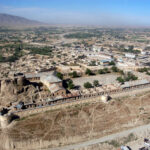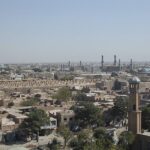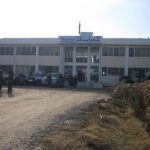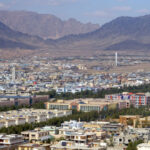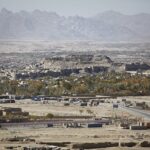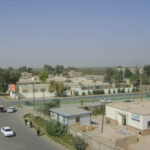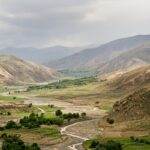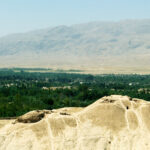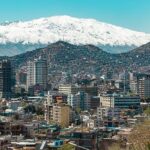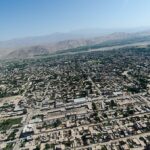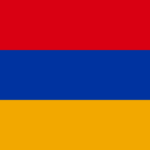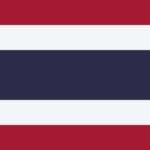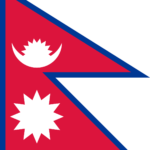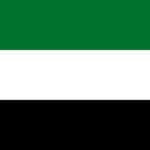Afghanistan
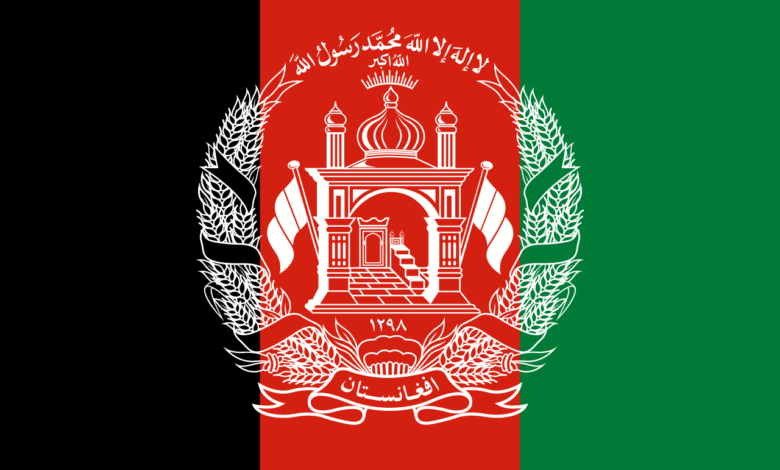
Find all vital information on the Islamic Republic of Afghanistan like its capital city, languages, geography, land border, currencies, population, surface area, etc.
Map View
View Larger Map
Country Names
| Common : | Afghanistan |
| Official: | Islamic Republic of Afghanistan |
| Common (Native) : | افغانستان |
| Official (Native) : | جمهوری اسلامی افغانستان |
Some Translations
| Arabic : | جمهورية أففانستان الإسلامية |
| French: | République islamique d’Afghanistan |
| Spanish : | República Islámica de Afganistán |
| Italiano : | Repubblica islamica dell’Afghanistan |
| Russian : | Исламская Республика Афганистан |
| Japanese : | アフガニスタン·イスラム共和国 |
Geography
| Time Zone : | UTC+04:30 |
| Region : | Asia |
| Subregion: | Southern Asia |
| Capital City : | Kabul |
| Demonym : | Afghan , Afghan |
| Lat/Lng : | 33,65 |
| Population : | About 40218234 inhabitants |
| Area : | 652230km² |
| Land borders : | IRN,PAK,TKM,UZB,TJK,CHN |
Languages
| Languages : | Dari , Turkmen , Pashto |
Other details
| Currencies : | Afghan afghani (Symbol: ؋) |
| COUNTRY CODE : | +9 (3) |
| ISO Codes : | AF / AFG |
Short Description Of Afghanistan
Afghanistan, officially the Islamic Emirate of Afghanistan, is a landlocked country located at the crossroads of Central Asia and South Asia. Referred to as the Heart of Asia, it is bordered by Pakistan to the east and south, Iran to the west, Turkmenistan to the northwest, Uzbekistan to the north, Tajikistan to the northeast, and China to the northeast and east. Occupying 652,864 square kilometres (252,072 sq mi) of land, the country is predominantly mountainous with plains in the north and the southwest, which are separated by the Hindu Kush mountain range. As of 2021, its population is 40.2 million (officially estimated to be 32.9 million), composed mostly of ethnic Pashtuns, Tajiks, Hazaras, and Uzbeks. Kabul is the country’s largest city and serves as its capital.
Human habitation in Afghanistan dates back to the Middle Paleolithic era, and the country’s strategic location along the historic Silk Road has led it to being described, picturesquely, as the ‘roundabout of the ancient world’. Popularly referred to as the graveyard of empires, the land has historically been home to various peoples and has witnessed numerous military campaigns, including those by the Persians, Alexander the Great, the Maurya Empire, Arab Muslims, the Mongols, the British, the Soviet Union, and most recently by an American-led coalition. Afghanistan also served as the source from which the Greco-Bactrians and the Mughals, among others, rose to form major empires. The various conquests and periods in both the Iranian and Indian cultural spheres made the area a center for Zoroastrianism, Buddhism, Hinduism, and later Islam throughout history.
The modern state of Afghanistan began with the Durrani dynasty in the 18th century, with the Durrani Afghan Empire being formed by Ahmad Shah Durrani. The Durrani Empire led conquests in which, at its peak, encompassed land that spanned from eastern Iran to northern India. Following its decline and the death of Ahmad Shah Durrani, and Timur Shah, it was divided into multiple smaller independent kingdoms, including but not limited to: Herat, Kandahar and Kabul. Afghanistan would be reunited in the 19th century after 70 years of civil war from 1793-1863, with wars of unification led by Dost Mohammad Khan, where he conquered the independent principalities in Afghanistan. Dost Mohammad died in 1863, weeks after his last campaign to unite Afghanistan, and as a result, threw Afghanistan back into civil war with his successors. During this time, Afghanistan became a buffer state in the Great Game between the British Empire (in British-ruled India) and the Russian Empire. From India, the British attempted to subjugate Afghanistan but were repelled in the First Anglo-Afghan War. However, the Second Anglo-Afghan War saw a British victory and the successful establishment of British political influence over Afghanistan. Following the Third Anglo-Afghan War in 1919, Afghanistan became free of foreign dominance and eventually emerged as the independent Kingdom of Afghanistan in June 1926 under Amanullah Khan. This monarchy lasted almost 50 years, until Zahir Shah was overthrown in 1973, following which the Republic of Afghanistan was established.
Since the late 1970s, Afghanistan’s history has been dominated by extensive warfare, including coups, invasions, insurgencies, and civil wars. The conflict began in 1978 when a communist revolution established a socialist state, and subsequent infighting prompted the Soviet Union to invade Afghanistan in 1979. Mujahideen fought against them in the Soviet–Afghan War and continued fighting amongst themselves following Soviet withdrawal in 1989. The Islamic fundamentalist Taliban controlled most of the country by 1996, but their Islamic Emirate of Afghanistan received little international recognition before its overthrow in the 2001 United States invasion of Afghanistan. The Taliban returned to power in 2021 following Kabul’s capture by the Taliban and the concurrent overthrow of the Islamic Republic of Afghanistan, ending the 2001–2021 war. Although initially claiming to form an inclusive government for the country, the Taliban in September 2021 re-established the Islamic Emirate of Afghanistan with an interim government made up entirely of Taliban members; the regime currently remains internationally unrecognized.
Afghanistan is prominently rich in natural resources, including lithium, iron, zinc, and copper, amongst many others. It is also the world’s largest producer of opium, second largest producer of cannabis, and third largest of both saffron and cashmere. The country is a member of the South Asian Association for Regional Cooperation and a founding member of the Organisation of Islamic Cooperation. Due to the effects of war in recent decades, the country has dealt with high levels of terrorism, poverty, and child malnutrition. Afghanistan’s economy is the world’s 96th-largest, with a gross domestic product (GDP) of $72.9 billion by purchasing power parity. Afghanistan is one of the least developed countries ranking 180th on the Human Development Index, and fares much worse in terms of per-capita GDP (PPP), ranking 169th out of 186 countries as of 2018.
National Anthems
Learn more about the National Anthems of Afghanistan from here.
Cities and towns in Afghanistan
Herat
Check Voyage info and Guide for Afghanistan Here Check the weather in Afghanistan Here Herat is a city located in western Afghanistan. It is the capital of Herat Province and is one of the country’s largest and historically significant cities.…
Kandahar
Check Voyage info and Guide for Afghanistan Here Check the weather in Afghanistan Here Kandahar is a city located in the southern part of Afghanistan. It is one of the country’s major cultural and economic centres, as well as the…
Lashkargah (Lashkar Gah)
Check Voyage info and Guide for Lashkargah (Lashkar Gah) Here Check the weather in Lashkargah (Lashkar Gah) Here Lashkargah is a city in southern Afghanistan and serves as the capital of Helmand Province. It is a significant urban centre in…
